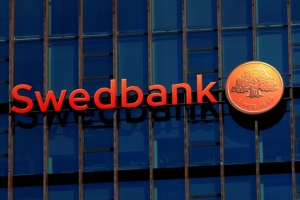Analytics, Covid-19, Economics, Financial Services, GDP, Latvia, Markets and Companies
International Internet Magazine. Baltic States news & analytics
Sunday, 21.12.2025, 14:57
Swedbank reduces Latvia's GDP reduction forecast for 2020 to 5%
 Print version
Print version |
|---|
At the same time, the bank expects that growth will return to Latvia next year, but in 2021 economic growth will be slightly slower than previously forecast.
Swedbank currently expects that in 2021 Latvia's GDP will grow by 4.2% instead of the previously forecasted 4.3%, but in 2022 the Latvian economy is forecast to grow by 3.3%. At the same time, Swedbank has increased its average annual inflation forecasts for this year and next.
The bank expects that in 2020 the average annual inflation in Latvia will be 0.7%, compared to the previously forecasted 0.1%, but next year - in the amount of 2%, compared to the previously forecasted 1.6%. In turn, in 2022, the bank forecasts an average annual inflation of 3%.
Swedbank has also reduced its GDP decline forecasts for Lithuania and Estonia this year, while adjusting its economic growth forecasts for next year.
The bank forecasts that the Lithuanian economy is expected to contract by 1.7% this year instead of the previously forecasted 6.5%, while next year the economy will grow by 4.9% instead of the previously forecasted 4.5%, but in 2022 GDP is expected to increase by 3.4%.
In turn, Estonia's GDP decline forecast for this year has been reduced from 7% to 5%, while next year's economic growth is forecast at 4.5% instead of the previously expected 5%. In 2022, Swedbank forecasts 3% GDP growth in Estonia.
At the same time, the average annual inflation forecast in Lithuania has been increased from 1% to 1.2% for this year, and from 2.3% to 2.5% for the next year, while in 2022 the average annual inflation forecast is 2.8%.
In Estonia, on the other hand, Swedbank expects deflation of 0.2% this year, compared to the previous forecast of an average annual inflation of 0.4%. Next year, the average annual inflation forecast in Estonia has been reduced from 1.3% to 1.1%, while in 2022 the bank forecasts an average annual inflation of 2% in Estonia.
''Latvia has been relatively successful at managing the COVID-19 crisis so far, and the economy has suffered less than the rest of euro area. Following a sharper than expected drop in the first quarter, activity in the second quarter declined by 9.8% over the same period of the previous year. Several parts of the economy are recovering faster than expected. For instance, industrial production, goods exports, and retail trade seem to have recovered to close to or even above the levels of last year. The registered unemployment rate peaked in June, with government support limiting the extent of the increase. Due to improving economic activity and the opening of more seasonal jobs, the number of registered unemployed inched down in July and early August. Survey data points to an improving outlook, with industrial and construction confidence approaching their long-term averages, while remaining below last year’s levels. Meanwhile, services confidence is still notably depressed and has seen slower improvement than other sectors,'' said Swedbank's chief economic expert in Latvia Liva Zorgenfreija.
''We expect GDP in the third quarter to reflect a strong rebound, with the economy regaining much of the ground lost in the first half of the year. Overall, assuming the virus remains largely under control going forward, GDP projections in mid-May seem to have been overly pessimistic. The forecast for this year has been raised to -5%, with consumption leading the way in recovery, while exports and investments are expected to lag. During the next two years, the front-loading of EU funds should boost investment. Stimulus programs across Europe should also aid the export recovery, especially given that a large part of the Latvian exports is construction related. The economy is projected to reach its pre-crisis level by the start of 2022,'' she said.
''The labour market will be lagging the economy somewhat. We expect the unemployment rate to gradually decline, averaging 8.3% in 2020, with a more marked recovery going forward. Wage growth slowed considerably during the crisis months and is expected to remain sluggish throughout this year, averaging 3%. Labour shortages are expected to reappear in some sectors as a result of broad-scale construction works and investment projects, boosting wage growth in the next two years to 5.5% and 6%, respectively,'' the expert added.
- 28.01.2022 BONO aims at a billion!
- 25.01.2021 Как банкиры 90-х делили «золотую милю» в Юрмале
- 30.12.2020 Накануне 25-летия Балтийский курс/The Baltic Course уходит с рынка деловых СМИ
- 30.12.2020 On the verge of its 25th anniversary, The Baltic Course leaves business media market
- 30.12.2020 Business Education Plus предлагает анонсы бизнес-обучений в январе-феврале 2021 года
- 30.12.2020 Hotels showing strong interest in providing self-isolation service
- 30.12.2020 EU to buy additional 100 mln doses of coronavirus vaccine
- 30.12.2020 ЕС закупит 100 млн. дополнительных доз вакцины Biontech и Pfizer
- 29.12.2020 В Rietumu и в этот раз создали особые праздничные открытки и календари 2021
- 29.12.2020 Latvia to impose curfew, state of emergency to be extended until February 7








 «The Baltic Course» Is Sold and Stays in Business!
«The Baltic Course» Is Sold and Stays in Business!

